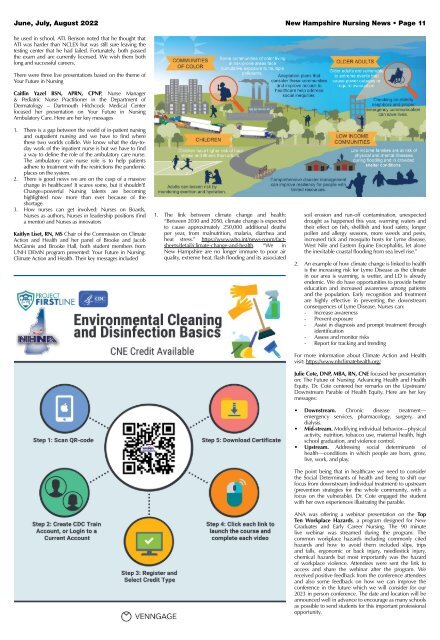New Hampshire Nursing News - June 2022
Create successful ePaper yourself
Turn your PDF publications into a flip-book with our unique Google optimized e-Paper software.
<strong>June</strong>, July, August <strong>2022</strong> <strong>New</strong> <strong>Hampshire</strong> <strong>Nursing</strong> <strong>New</strong>s • Page 11<br />
he used in school, ATI. Benson noted that he thought that<br />
ATI was harder than NCLEX but was still sure leaving the<br />
testing center that he had failed. Fortunately, both passed<br />
the exam and are currently licensed. We wish them both<br />
long and successful careers.<br />
There were three live presentations based on the theme of<br />
Your Future in <strong>Nursing</strong><br />
Caitlin Yazel BSN, APRN, CPNP, Nurse Manager<br />
& Pediatric Nurse Practitioner in the Department of<br />
Dermatology – Dartmouth Hitchcock Medical Center<br />
focused her presentation on Your Future in <strong>Nursing</strong><br />
Ambulatory Care. Here are her key messages<br />
1. There is a gap between the world of in-patient nursing<br />
and outpatient nursing and we have to find where<br />
these two worlds collide. We know what the day-today<br />
work of the inpatient nurse is but we have to find<br />
a way to define the role of the ambulatory care nurse.<br />
The ambulatory care nurse role is to help patients<br />
adhere to treatment with the restrictions the pandemic<br />
places on the system.<br />
2. There is good news we are on the cusp of a massive<br />
change in healthcare! It scares some, but it shouldn’t!<br />
Change=powerful <strong>Nursing</strong> talents are becoming<br />
highlighted now more than ever because of the<br />
shortage.<br />
3. How nurses can get involved: Nurses on Boards,<br />
Nurses as authors, Nurses in leadership positions (find<br />
a mentor) and Nurses as innovators<br />
Kaitlyn Liset, RN, MS Chair of the Commission on Climate<br />
Action and Health and her panel of Brooke and Jacob<br />
McGinnis and Brooke Hall, both student members from<br />
UNH DEMN program presented: Your Future in <strong>Nursing</strong>:<br />
Climate Action and Health. Their key messages included<br />
1. The link between climate change and health:<br />
“Between 2030 and 2050, climate change is expected<br />
to cause approximately 250,000 additional deaths<br />
per year, from malnutrition, malaria, diarrhea and<br />
heat stress.” https://www.who.int/news-room/factsheets/detail/climate-change-and-health.<br />
“We in<br />
<strong>New</strong> <strong>Hampshire</strong> are no longer immune to poor air<br />
quality, extreme heat, flash flooding and its associated<br />
soil erosion and run-off contamination, unexpected<br />
drought as happened this year, warming waters and<br />
their effect on fish, shellfish and food safety, longer<br />
pollen and allergy seasons, more weeds and pests,<br />
increased tick and mosquito hosts for Lyme disease,<br />
West Nile and Eastern Equine Encephalitis, let alone<br />
the inevitable coastal flooding from sea level rise.”<br />
2. An example of how climate change is linked to health<br />
is the increasing risk for Lyme Disease as the climate<br />
in our area is warming, is wetter, and LD is already<br />
endemic. We do have opportunities to provide better<br />
education and increased awareness among patients<br />
and the population. Early recognition and treatment<br />
are highly effective in preventing the downstream<br />
consequences of Lyme Disease. Nurses can:<br />
- Increase awareness<br />
- Prevent exposure<br />
- Assist in diagnosis and prompt treatment through<br />
identification<br />
- Assess and monitor risks<br />
- Report for tracking and trending<br />
For more information about Climate Action and Health<br />
visit: https://www.nhclimatehealth.org/<br />
Julie Cote, DNP, MBA, RN, CNE focused her presentation<br />
on: The Future of <strong>Nursing</strong>: Advancing Health and Health<br />
Equity. Dr. Cote centered her remarks on the Upstream/<br />
Downstream Parable of Health Equity. Here are her key<br />
messages:<br />
• Downstream. Chronic disease treatment—<br />
emergency services, pharmacology, surgery, and<br />
dialysis.<br />
• Mid-stream. Modifying individual behavior—physical<br />
activity, nutrition, tobacco use, maternal health, high<br />
school graduation, and violence control.<br />
• Upstream. Addressing social determinants of<br />
health—conditions in which people are born, grow,<br />
live, work, and play.<br />
The point being that in healthcare we need to consider<br />
the Social Determinants of health and being to shift our<br />
focus from downstream (individual treatment) to upstream<br />
(prevention strategies for the whole community, with a<br />
focus on the vulnerable). Dr. Cote engaged the student<br />
with her own experiences illustrating the parable.<br />
ANA was offering a webinar presentation on the Top<br />
Ten Workplace Hazards, a program designed for <strong>New</strong><br />
Graduates and Early Career <strong>Nursing</strong>. The 90 minute<br />
live webinar was streamed during the program. The<br />
common workplace hazards including commonly cited<br />
hazards and how to avoid them included slips, trips<br />
and falls, ergonomic or back injury, needlestick injury,<br />
chemical hazards but most importantly was the hazard<br />
of workplace violence. Attendees were sent the link to<br />
access and share the webinar after the program. We<br />
received positive feedback from the conference attendees<br />
and also some feedback on how we can improve the<br />
conference in the future which we will consider for our<br />
2023 in person conference. The date and location will be<br />
announced well in advance to encourage as many schools<br />
as possible to send students for this important professional<br />
opportunity.

















